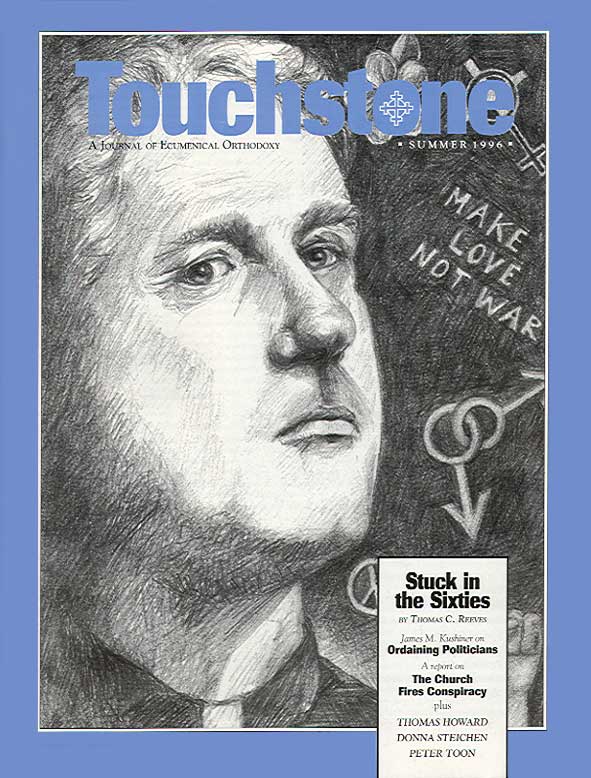Are Values the Same as Virtues?
by Peter Toon
Many churches in America support “family values” and use Sunday School programs that claim to promote them. Further, many individual Christians also support organizations that exist to protect traditional morality and which use the word “values” in their official titles—e.g., The Center for Jewish and Christian Values and The Institute for American Values. It appears that in modern America there are many different “values” and that traditionalists have to identify theirs (i.e., their moral codes and ideals) by using an appropriate adjective. Apparently there is no objective standard, ideal or divine law to which most if not all Americans can appeal. But should orthodox believers be using the noun “values” at all?
Values & the Death of God
The normal meaning of “value,” used as a noun and a verb, is related to worth—the worth of money or some other commodity, for example. We speak of the value of our houses, our used cars and of the stocks and shares that we own. When we think we have got a good deal we speak of getting value for our money. And within the New Testament we read that Jesus spoke of a “pearl of great value” (Matt. 13:46) and of man being “of more value than many sparrows” (Matt. 10:31).
The plural noun, values, is, however, something different. It is not simply the plural of value, where value is “worth.” In fact it does not occur in the Oxford English Dictionary of 1928, but first appears in the 1989 edition. The use of “values” is to be traced to the influence of Friedrich Nietzsche (1844–1900), a German philosopher and son of a Lutheran pastor. (He was the author of Also Sprach Zarasthustra, which is now widely studied in American colleges and universities.)
It was in the 1880s that Friedrich Nietzsche began to speak of “values” in its present sense—not as a verb, meaning to value or to esteem something; not as singular noun, meaning the measure of a thing (the economic value of money, labor or property); but in the plural, connoting the moral beliefs and attitudes of a society. Moreover, he used the word consciously, repeatedly, indeed insistently, to signify what he took to be the most profound event in human history. (Gertrude Himmelfarb, The Demoralization of Society, 1994, p. 10.)
That “profound event” was what he called “the death of God,” a phrase he bequeathed to the West.
Nietzsche’s “transvaluation of values” (as it has been called) was intended as the final revolution against both the classical and the Christian virtues. For him “the death of God” meant the death of morality and truth. Henceforth there would be no good or evil, no virtue or vice, no truth or falsehood and no fruit of the Spirit or works of the sinful flesh. There would only be neutral “values”—beliefs, attitudes, feelings, habits, conventions, preferences and prejudices.
Buying into Values Today
Nietzsche’s ideas were taken up by sociologists, psychologists and historians and widely disseminated in recent times by educators and by journalists. Thus “values” are now firmly in place in western society. The word is used by thousands who have no idea that “values” (strictly speaking) are not the same as “virtues.” Another way to express this is to state that relativism (the view that there is no final truth or morality but that all opinions are subjective and on an equal footing) is part of the cultural air we both inhale and exhale. And, of course, it makes sense because of the diversity of human behavior and the fact that some good people are irreligious.
In public education our children are taught that any evaluation and judgment of human activity and behavior should contain no (claimed) universal, objective standard or moral criteria. Even in churches it is explained to the faithful that biblical morality is flawed because it originated in a male-dominated, pre-modern and unliberated society! The real, abiding teaching of the Bible (as read through modern enlightened eyes), it is said, is “love,” which means recognizing the values of others and not imposing ours upon them.
So it is not surprising that we now speak of “value-free” judgments in counseling and education, meaning that we are not allowed to encourage or force anyone to believe anything we believe or that they do not want to believe. Committed as we are to “values” there is nothing in and of itself which is, or can be, right or wrong for any of us! If something is meaningful to you or to me or for any of us then it is part of “values.”
The Power of Virtue
“Virtue” is a word not used much today and is not usually found in modern translations of the Bible. However, it is used six times in the King James Version of 1611. On three occasions it is said that “virtue has gone out of Jesus” (Mark 5:30; Luke 6:19; Luke 8:46) and the Greek word is dunamis, meaning power or strength. And on three occasions “virtue” is presented as a quality of valor, excellence or “manliness” (2 Peter 1:3;1:5;1:5): here the Greek word is arete.
Here the older Latin meaning of virtus from vir (man) is operative where virtue is seen as “manly excellence,” the perfection to which man, as a creature made in the image of God, is called. “Manliness” is thus strength and excellence of character. (See Cassell’s New Latin Dictionary, 1960.) Before the Fall virtue was the result of God’s power in innocent man; after the Fall virtue is a result of the grace of God in sinful man. But virtue is always man aiming for the true (objective) good.
Virtue is from the medieval Latin virtus which means worth, merit, moral perfection. As used by the Church of the West a virtue is a habitual and firm disposition to do the good, where the good is established by God’s revelation of his will.
Human virtues are firm attitudes, stable dispositions, habitual perfections of intellect and will that govern our actions, order our passions, and guide our conduct according to reason and faith. They make possible ease, self-mastery, and joy in leading a morally good life. (Catechism of the Catholic Church, 1994, Article 7.)
So the virtuous person is the one who freely practices what is good in the sight of God.
Virtue & Christian Religion
In textbooks of Catholic moral theology we learn of the cardinal virtues (the human virtues of prudence, temperance, fortitude and justice) and the theological virtues (faith, hope and charity). The cardinal (pivotal) or human virtues are rooted in the theological virtues, which enable man to live in a right relation with God, the Father, through the Son and with the Holy Spirit. Faith, hope and charity are the basis for all moral activity approved and blessed by God. This is because they are infused or planted in the regenerate soul by the action of the Holy Spirit. By their presence the faithful are enabled to pursue the good and practice the cardinal virtues in daily living.
The cardinal virtues are pivotal, said the medieval moral theologians, for all the other human virtues are grouped around them. Prudence is the virtue that enables us to discern our true good in changing, daily circumstances and to choose the right means to achieve it. Justice is the virtue by which with a firm will we determine to do right to God and to our fellow human beings. Fortitude is the virtue by which we exercise firmness in difficulties and are constant in the pursuit of the good. Finally, temperance is the virtue that moderates the attraction of pleasures and also provides balance in the use and employment of what God has provided for us: by it we have mastery over instincts and keep our desires within what is acceptable to God.
So we see that virtues are related to God-given standards to which Christians are to aim. In his book, Back to Virtue, Peter Kreeft shows how the Beatitudes point to virtues. They represent the movement towards an ideal to which disciples of Christ are to strive in order to glorify God. As such they cannot be replaced by alternative attitudes and dispositions. To believe that they are negotiable is to make them into mere opinions and part of the relativism of the supermarket of possibilities for human action.
Last century, because of the general influence of evangelical Protestantism in industrial society, the practical virtues were generally held to include hard work, thrift, cleanliness, honesty and self-reliance. However, preachers and moralists saw them (like the cardinal virtues in Catholic theology) as the outworking of the primary, biblical virtues of faith, hope and charity. (Today they are mistakenly called “Victorian values” and Margaret Thatcher is often presented as the popularizer of them, although she preferred to speak of “virtues.”) In fact, both Protestant and Catholic thinking on virtue took its cue from the words of St. Paul:
Finally, brethren, whatever is true, whatever is honorable, whatever is just, whatever is lovely, whatever is gracious, if there is any excellence, if there is anything worthy of praise, think about these things. What you have learned and received and heard and seen in me, do (Philippians 4:8).
In the context it is obvious that what the apostle Paul is saying is: “Reflect upon and allow these qualities of living to shape your conduct.”
A Time to Choose Virtue
It would seem to be clear that, given belief in God’s self-revelation to mankind, biblical norms, standards, and ideals cannot possibly—as far as faithful believers are concerned—give rise to “values” of the kind expounded by Nietzsche and popularized by his disciples. The call to moral perfection and holiness, found in the prophets of Israel as well as in the teaching of Jesus and his apostles, is a call to cultivate godly virtues not relativistic values! At the end of the age the Judgment of the world is to be according to objective morality and truth as defined by the unchanging Lord God.
Certainly, the language of “values” now permeates both liberal Judaism and the mainline Christian denominations. Such language helps to create in people a sense of entitlement, since it is utterly subjective and not open to any external scrutiny. Further, talk of “values” distorts the principle of worship (worth-ship in old English) since worth must be objective rather than subjective. Worship of the Lord God Almighty leads to genuine human freedom, whereas adoption of “values” leads to subjectivism, pantheism and eventually to tyranny.
Is it time for the recovery and general use of the word “virtues” by orthodox believers when they speak of what they believe is revealed by God for the good of man? If not, is it time to coin or make use of another word instead of values, a word whose meaning points to an objective, transcendent ideal or standard or law?
“O Lord, who hast taught us that all our doings without charity are nothing worth; Send thy Holy Ghost and pour into our hearts that most excellent gift of charity, the very bond of peace and all virtues, without which whosoever liveth is counted dead before thee. Grant this for thine only Son Jesus Christ’s sake. Amen.”
The Reverend Dr. Peter Toon, a contributing editor, is the President of the Prayer Book Society of the Episcopal Church and acting rector of Christ Church, Danville, Virginia. He has recently published Yesterday, Today and Forever: Jesus Christ and the Holy Trinity in the Decrees of the Seven Ecumenical Councils (Preservation Press, Swedesboro, New Jersey).
subscription options
Order
Print/Online Subscription

Get six issues (one year) of Touchstone PLUS full online access including pdf downloads for only $39.95. That's only $3.34 per month!
Order
Online Only
Subscription

Get a one-year full-access subscription to the Touchstone online archives for only $19.95. That's only $1.66 per month!
bulk subscriptions
Order Touchstone subscriptions in bulk and save $10 per sub! Each subscription includes 6 issues of Touchstone plus full online access to touchstonemag.com—including archives, videos, and pdf downloads of recent issues for only $29.95 each! Great for churches or study groups.
Transactions will be processed on a secure server.
more from the online archives

11.5—September/October 1998
Speaking the Truths Only the Imagination May Grasp
An Essay on Myth & 'Real Life' by Stratford Caldecott
calling all readers
Please Donate
"There are magazines worth reading but few worth saving . . . Touchstone is just such a magazine."
—Alice von Hildebrand
"Here we do not concede one square millimeter of territory to falsehood, folly, contemporary sentimentality, or fashion. We speak the truth, and let God be our judge. . . . Touchstone is the one committedly Christian conservative journal."
—Anthony Esolen, Touchstone senior editor








